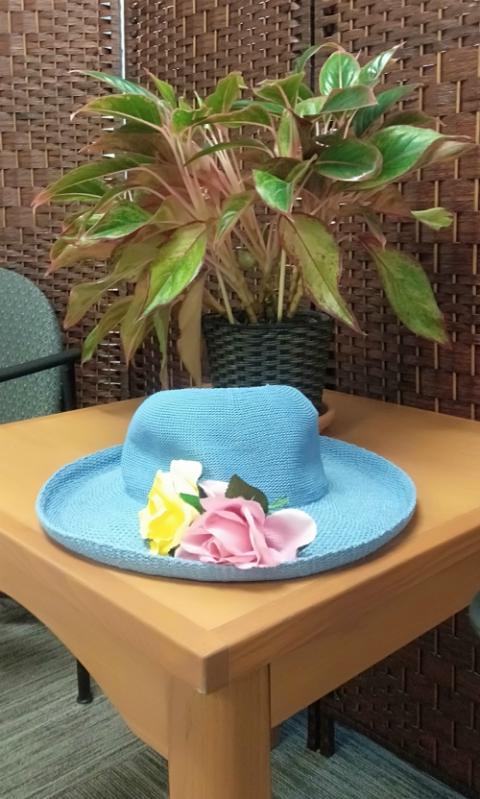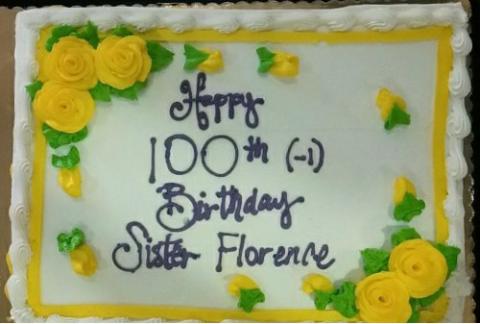
"When great souls die, the air around us becomes light, rare, sterile. We breathe, briefly. Our eyes, briefly, see with a hurtful clarity. Our memory, suddenly sharpened, examines, gnaws on kind words unsaid, promised walks never taken." —Maya Angelou (Honorine Uwimana)
Editor's note: Notes from the Field includes reports from young people volunteering in ministries of Catholic sisters. A partnership with Catholic Volunteer Network, the project began in the summer of 2015. This is our 10th round of bloggers: Honorine Uwimana is a St. Joseph Worker in Orange, California, and Samantha Kominiarek is an Assumption Mission Associate in Chaparral, New Mexico.
This blog post is dedicated to Sr. Lorraine Thibault and Sr. Florence Hund.
ORANGE, CALIFORNIA — For people familiar with the Belgian education system and its assessment methods, the notorious phrase "Prenez un quart de feuille" is reminiscent of school life.
I grew up in Rwanda, and our education system is rooted in the Belgian education pattern, so "Prenez un quart de feuille" is one of the phrases that make my heart beat faster.
"Prenez un quart de feuille" is the French equivalent of "Take a piece of paper," and during my school years, it would mark the announcement of an impromptu quiz, or "interrogation surprise," as we called it in French.
Our teachers would give us impromptu quizzes on the first day of school after long weeks of holidays; in the middle of class to make sure we were following along; or after a learning sequence when none of us had asked a question to make sure that our silence meant we understood the lesson.
Impromptu quizzes would be followed by a long silence during which most of us would regret not studying the previous night, not concentrating in class during the right time, or using the free time before every class to catch up with friends. After a period of remorse, we would try to convince the teacher to cancel the quiz or to not include its grades on our end-of-term school reports.
"Prenez un quart de feuille" always came as an alarm to remind us why we were in class, what mattered at the end of the school year, and to do the right things in the right time.
Advertisement
Years passed, and I celebrated the end of my academic years and, of course, my liberation from impromptu quizzes. My ears slowly forgot the terrific sound of "Prenez un quart de feuille." Little did they know I was going to face impromptu wake-up calls in different ways, including through sorrow.
Serving at Regina Residence, a retirement home for the Sisters of St. Joseph of Orange, California, opens my eyes to suffering and decodes the mystery of grief and death.
I have faced death in the past, and I have lost many beloved relatives after long days of prayers begging God to grant them more time.

Sister Lorraine's hat (Honorine Uwimana)
My first experience with death during my year of service happened only one month after I started serving at Regina Residence. Death took a beautiful soul, Sr. Lorraine Thibault, whom I would spend my time with during recreational activities or meet in her blue hat in the corridors to or from her room. She would always smile to greet me and would open her arms wide for a hug until the day she could not leave her room anymore.
I would pass by her room once in a while and hold her hand to pray, to ask for a miracle to see her again on her feet. Despite my supplications, on Oct. 7, she went back home to God.
We celebrated her life with good memories and with gratitude for the blessing she was, but her death deeply disheartened me.
Though I accepted God's will and prayed for her rest, I still wish I had spent more time with her. I wish I knew what her greatest desires were before her last breath, and I wish I had granted them in what capacity I could.
While I was still spinning in a spiral of shock and confusion, Sr. Florence Hund's health worsened, and for days, she could not leave her room, talk or open her eyes. Though she was suffering while taking her last breaths, she peacefully consented to her pain.
I had good memories of her that I cherished and was not ready to let go. Sister Florence was the first sister I pushed in a wheelchair on our way back from the coffee shop. She would unceasingly admire how green the gardens were. She had celebrated her 99th birthday on Sept. 17 in a beautiful birthday party. We shared her joy, her life and her cake.

The cake celebrating Sister Florence's 99th birthday (Honorine Uwimana)
A few days before her departure to heaven, a small note was placed on her door to remind visitors that she loved the presence of people and enjoyed when people held her hands.
In the few days that preceded Nov. 7, I would go to her room, hold her hand, pray or remind her of the moments we spent together.
Both her silence and my heart would remind me that my frequent visits and heartfelt availability would have been more appreciated when her health was more stable and when she was alone in her room.
Death was whispering to me the same words that used to trigger my preparedness — "Prenez un quart de feuille" — though in a different fashion and with new lessons.
I had developed the wrong attitude toward death over time. Seeing sisters suffering and realizing how they kept their tenderness even through their last days caused a paradigm shift in my mind and reminded me to accept and appreciate each stage of life.

Holding Sister Florence's hand in her last days (Honorine Uwimana)
I unceasingly prayed to get another chance with them, and it taught me to not leave any word unsaid or any act of kindness undone and that the right time to do it is the present time.
Grief taught me to appreciate and pay attention to death, for it is the greatest teacher of life's important lessons. I came to honor death as a part of life and not as its antipode.
Lastly, death reminded me that I can't know which memories of me people carry with them when they go, and I should give them the best while they are still alive.
My closeness to the suffering and dying spurred in me a sincere repentance and elucidated to me the essentials of life.
[Honorine Uwimana is a St. Joseph Worker from Rwanda serving at Regina Residence with the Sisters of St. Joseph of Orange, California.]








